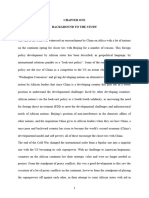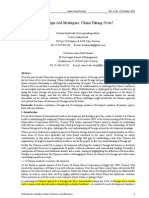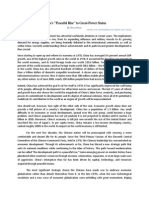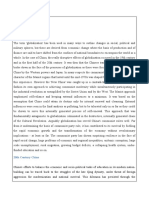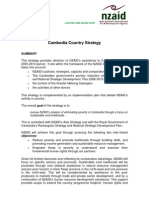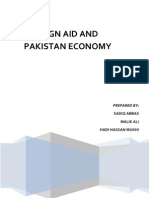Overturning The Wall: Building China's Soft Power in Africa: He Wenping
Overturning The Wall: Building China's Soft Power in Africa: He Wenping
Uploaded by
Sonya DewiCopyright:
Available Formats
Overturning The Wall: Building China's Soft Power in Africa: He Wenping
Overturning The Wall: Building China's Soft Power in Africa: He Wenping
Uploaded by
Sonya DewiOriginal Title
Copyright
Available Formats
Share this document
Did you find this document useful?
Is this content inappropriate?
Copyright:
Available Formats
Overturning The Wall: Building China's Soft Power in Africa: He Wenping
Overturning The Wall: Building China's Soft Power in Africa: He Wenping
Uploaded by
Sonya DewiCopyright:
Available Formats
Overturning the Wall: Building Chinas Soft Power in Africa
He Wenping
t will be remembered that in the prelude to the 2008 Beijing Olympics, the Olympic torch met with violent mobs as it passed through Paris and London. In the aftermath of these disappointing events Chinas ambassador to Great Britain, Fu Ying, published an article in which she lamented that the wall that stands between China and the West is thick, and that the two societies negative impressions of each other are growing at a worrying rate.1 Despite 30 years of close economic interaction since reform and opening, Western countries and China have continued to disagree on ideology, value systems and political aspirations. A wall continues to separate the East from the West.
Unfortunately for China, through the dominance of Western media and academia, the Wests negative perception of Chinese policies has spread to other regions as well, particularly Africa. Fueled by Western influence, negative terms such as China threat theory and new colonialism theory have entered African vocabularies, building up another high wall in the middle of Sino-African relations. In order to reverse this process and improve its image in both the West and Africa, China should leverage its
He Wenping is a research fellow for the Institute of West-Asian and African Studies, Chinese Academy of Social Sciences. She is also the secretary general for the Chinese Asian and African Research Society.
China Security, Vol. 6 No. 1, 2010, pp. 63-69 2010 World Security Institute
China Security Vol. 6 No. 1
63
Building Chinas Soft Power in Africa
sources of soft power, such as its language, culture and political value systems. This will stand in stark contrast to Africa's past colonial experiences and will earn China respect both there and abroad.
The Appeal of Chinas Model
Chinas dramatic shift from a backwards to an advanced economy in only 30 years has attracted global attention, particularly from African countries looking to escape cycles of poverty. Achieving modernization in a globalized world is challenging for developing countries, and each country is exploring development models. Chinas experience is relevant to developing countries because it did not copy the Western model, but followed its own national condition in selecting which lessons to emphasize. According to the Beijing Consensus, China is proceeding carefully with development, emphasizing social stability, effective governance and avoiding the use of shock therapy to achieve great leaps forward.2 Some Western writers have even argued that Chinas economic development model is suitable for other developing countries. In addition to replacing the Washington Consensuss overemphasis on liberalization, the Beijing Consensus has begun to change the entire international development structure, starting with economic, social and political aspects. Although the Chinese government has never formally endorsed the Beijing Consensus, the concept has fueled a global debate over the path for developing countries. Whether other countries adopt Chinas model in whole or part, it has been established as a viable alternative to the traditional Western approach. Sharing this message with African countries should be the main content of soft power construction at this stage. The appeal of Chinas development model is amplified by the strong foundation of Sino-African relations over the last half-century. Even as the international situation has changed, Chinas Africa policy has remained consistent and it has never ignored African countries due to changing relations with other great powers. To this day the five principles for developing relations with African and Arabic countries put forth by Premier Zhou Enlai in the 1960s, along with Chinas eight principles for foreign economic technological aid, are still the important guiding ideology and principles for the development of SinoAfrican relations.3 After the end of the Cold War, as the West tried to force democracy onto Africa by tying aid to democratization, China maintained that choosing a development path and political system are internal matters for African countries. China argued that outside countries should not interfere with domestic affairs or impose their value systems, ideologies or development models on other countries. When working with African countries China has never posed as a great power or sought personal gain, has always respected the sovereignty of aid-receiving countries and has not seen aid as a one-dimensional grant. In addition, no political conditions have been placed on the provision of aid and no special rights have been demanded. The African people have come to recognize China as being completely different from the Western nations that once colonized them.
64
China Security Vol. 6 No. 1
He Wenping
After the establishment of the Sino-African Cooperation Forum in 2000, China offered practical assistance to African countries in the form of debt reduction, reduced tariffs on African products, job training, increased business investment and community investment in schools and hospitals. The first session of the Sino-African summit in 2006 did even more to ensure the establishment of a comprehensive and cooperative partnership built on political trust, mutual economic benefit and cultural exchanges. Sino-African cooperation on security issues and China's rise as Africas second largest trading partner demonstrate the extent of Beijings hard power (political and economic influence) in Africa. However, the persistence of negative views and misconceptions magnify the fact that Chinas soft power (the appeal of culture and value systems) in Africa still trails far behind.
Differences in Ideas and Value Systems
Although Chinas achievements in economic development are recognized throughout the world, its political operating model for sustaining these achievements has met a variety of reactions. The West, according to its innate understanding of democracy and human rights, tends to put China in the one-party system and non-democratic column of nations. Thus Westerners have suspicions of African nations growing affinity for the Chinese-style development. Through Africas 20 years of developing multi-party democracy, many of these concerns have been absorbed by Africa. The Western rhetoric on democracy and human rights has already claimed the ideological and moral high ground. The terms democracy and human rights often appear in government documents and daily speech, and Africans are very proud of the quick development of non-governmental organizations (NGOs) and civil society. The African intelligentsia do not quite understand Chinas democracy and human rights situation and even feel that China does not pay a proper amount of attention to these issues in Africa. In recent years, following educational exchanges with the United States and Europe and the elections of former opposition leaders in some countries (such as Kenyas Prime Minister Odinga and Ghanas new president, John Mills), many African countries leaders and governments have drawn closer to the Western conceptualization of democracy and human rights. For a long time Western countries have held high the flags of democracy, freedom and human rights, occupying the moral high ground of public opinion with much selfcongratulation. It will undoubtedly be hard for China to break past this barrier in the short term. However, Chinas huge advantage is that its path over the past 30 years and all of the economic accomplishments it has achieved demonstrate the effective combination of Chinas political system and a market economy. Since Africas democratization has come from foreign plants and democracy has been disrupted by election conflicts, social unrest and low efficiency, ruling parties and leaders have sought to learn from Chinas model. In fact, although the flags of democracy, freedom and human rights are quite brilliant, their content is very general and achieving them is even more difficult.
China Security Vol. 6 No. 1
65
Building Chinas Soft Power in Africa
Instead, if China takes up the banner of poverty reduction, achieving the UN Millennium Development Goals and the mutual enjoyment of the fruits of globalization, its message will speak more directly to Africas real concerns. This also comes with expectations of such development being effectively reproduced in Africa. Rather than pit itself against the West in the context of democracy, freedom and human rights, China should focus on areas where it can achieve tangible progress: poverty reduction and economic development.
Setting the Agenda
In a globalized world with complex and rapidly changing geopolitics, China cannot afford to passively wait for the Western media to set the agenda. Rather than replying to the Wests constantly changing criticisms and striving to explain that it is neither neocolonialist nor a threat, China should take the initiative and communicate its intentions directly. This means publicizing what it supportsreducing poverty, South-South cooperation and mutual developmentwhile clearly emphasizing its differences with Western policy. As the deputy director of the Central Foreign Affairs Office, Qiu Yuanping, described in a speech last year, internationally, it is often the case that whoever first puts forward a complete and mature theory or concepteven if it is only a wise proposal or motion will then have the authority to speak out and a guiding influence. This is the power of culture and the power of wisdom.4 This recalls a comment made by former British Prime Minister Margaret Thatcher. She once impolitely pointed out that China could never become a superpower because it doesnt have a theory of international influence, as China just exports televisions and not ideas. What is heartening is that in recent years China has put forth concepts such as peaceful rise/development and harmonious world, making a contribution to the conduct of international relations. In order to continue to build on the foundation and global influence of these ideas, China should also promote the establishment of agendas such as cooperation between developing countries, stable economic development, green development and social harmony. Through the dissemination of research and information China can lead international opinion toward a focus on bettering quality of life.
Guiding Public Opinion
Any strategy or diplomatic policy needs a main actor to put it into effect. Given the rapid pace of globalization and the increasing plurality of actors within international relations, simply relying on the sole channel of official diplomacy is an insufficient response. As Qiu Yuanping correctly pointed out, As for public diplomacy, research should be done on how to bring different kinds of non-governmental actors into play, especially regarding the importance of think tanks and the use of many channels to work to respond to the pluralism of actors within international relations.5
66
China Security Vol. 6 No. 1
He Wenping
In Africa, the development of multi-party democracy since the end of the Cold War has already hastened the birth of an increasingly strong civil society with numerous non-governmental actors. The ability of these groups to guide public opinion, and even government action on foreign affairs, is continually strengthening. In China the development of think tanks and civil society still lags behind. As for think tanks, the quality and number of researchers and their influence on public opinion and government policy have all been on the rise. When compared horizontally with developed countries Chinas insufficient or with other domestic industries, they are still rather weak. public opinion propaIn addition, if just speaking of the establishment of think tanks that research Africa, they could be called the weak of ganda is at the root of the weak. As Britains University of Nottingham China Policy its difficulties in Africa . Research Institute research fellow Lu Yiyi said, an obvious shortcoming of Chinas soft power is its lack of NGOs at the international level and in Africa that could help reduce the negative side effects that have accompanied Chinas increased activity in Africa: On the international stage, Chinas NGOs are nowhere to be seen, thus making China lose out on one of soft powers key instruments and restricting Chinas public diplomacy. In fact, this problem goes beyond NGOs and can also be seen in Chinese scholars low level of exposure on the international stage. Many of the challenges China has encountered in Africa are related to the influence of the Western media and their love for covering negative news. However, these problems are very closely related to Chinas insufficient initiatives in public opinion propaganda. As for public opinion on the Darfur issue, Chinas national image already produces a negative effect among the Western masses that has irrationally spread. Even though China has worked hard to influence foreign public opinion, due to factors such as the limited vehicles of propaganda and insufficient English publications, it has still not been able to get its voice out to the Western masses. In its communication with the outside world China has generally felt it was best to wait for time to explain everything. The underlying idea was that, if the countrys actions were good, they would prove themselves and did not need to be emphasized by words. In regards to methods, China has also become used to preaching propaganda with insufficient facts and examples, causing Westerners to take a skeptical view of Sino-African relations. The final point China should keep in mind is that the most important discussion about Sino-African relations is not with the West but with African countries themselves. If the African media praise China, it is better than China promoting itself, and having the African media denounce the Wests fallacies is more convincing than when China does it. On this point there has already been some progress. China has invited delegations of African reporters to visit China and conduct some short-term training on news exchanges. At the same time, the Chinese embassies in Africa should arrange visits for leading reporters from Africas large newspapers to visit Chinese enterprises which are engaged in engineering projects for peoples livelihoods and other cooperative projects, increasing their knowledge on these matters.
China Security Vol. 6 No. 1
67
Building Chinas Soft Power in Africa
The Roots of Soft Power
Joseph Nye, who first put forth the idea of soft power, recently wrote that from the perspective of soft powers three sources, culture, value system and policy, the harm to the United States soft power was mainly due to the Bush administrations unilateral policies.6 Therefore, for the United States to reclaim its soft power, it simply needs to adjust its policies, and compared with the long-term accumulation and burnishing of culture and value systems, this would not be too difficult. Certainly the change in US administration has once again demonstrated to the world the US democratic systems ability to repair itself, adjust itself and renew itself. China, which lacks the same dominance in culture and value system, faces a comparatively more difficult task. In an era of globalization and pluralism, the appearance of differences in political and value systems between nations with different histories of development and national conditions is normal. To reach mutual understanding, there must be communication and dialogue regarding these differences, thereby avoiding a negative influence in foreign affairs. When Chinese representatives meet with African representatives, they should affirm Chinas respect for Africas democratic processes, and explain that Chinas bottom up model of democratic construction is due to its national circumstances but will reach the same goal as Africas from the top down method. For the time being, Chinas communications with Africa should focus on sharing its development experienceparticularly in areas of poverty reduction and development of manufacturing industriesand discussing models of governance and reform. Currently, however, China and Africa lack the diplomatic structures to support such a dialogue. Aside from the Sino-African Cooperative Forum, there are no institutionalized multilateral or bilateral exchange mechanisms. In comparison, China and the United States have more than 60 dialogue mechanisms, which help stabilize and nurture relations between the two countries. Beyond official government talks, there is an urgent need to expand and develop all levels of dialogue, including among business circles, academic circles and social organizations. Without abundant communication and mutual understanding China cannot expect its soft power in Africa to grow.
Compared with hard power, such as military and economic strength, the accumulation of soft power is a long and arduous process. The development of soft power is not only a diplomatic affair, but is also closely related to internal factors such as the degree of free thought, an intellectually diverse academic atmosphere and a focus on the development of individuals within the society (not a great power, little people mentality). Without an extensive internal cultivation of these roots of soft power it is impossible to speak of promoting it externally. Only through these adjustments can China break down the wall of misunderstanding separating it from the West and prevent new barriers from rising in its relations with Africa.
68
China Security Vol. 6 No. 1
He Wenping
Notes
Fu Ying, Reflecting on the Torchs Pass through London, Xinhua, <http://news.xinhuanet. com/overseas/2008-04/14/content_7971600.htm>. 2 See Joshua Cooper Ramo, The Beijing Consensus, British Foreign Policy Research Center, May 11, 2004. The article was translated and published in two parts in Chinas Cankao Ziliao on June 14 and 15, 2004. 3 Chinas eight principles for foreign economic technological aid are: i. The Chinese Government always bases itself on the principle of equality and mutual benefit in providing aid to other countries. It never regards such aid as a kind of unilateral alms but as something mutual. ii. In providing aid to other countries, the Chinese Government strictly respects the sovereignty of the recipient countries, and never attaches any conditions or asks for any privileges. iii. China provides economic aid in the form of interest-free or low-interest loans and extends the time limit for repayment when necessary so as to lighten the burden of the recipient countries as far as possible. iv. In providing aid to other countries, the purpose of the Chinese Government is not to make the recipient countries dependent on China but to help them embark step by step on the road of self-reliance and independent economic development. v. The Chinese Government tries its best to help the recipient countries build projects which require less investment while yielding quicker results, so that the recipient governments may increase their income and accumulate capital. vi. The Chinese Government provides the best-quality equipment and material of its own manufacture at international market prices. If the equipment and material provided by the Chinese Government are not up to the agreed specifications and quality, the Chinese Government undertakes to replace them. vii. In providing any technical assistance, the Chinese Government will see to it that the personnel of the recipient country fully master such technique. viii. The experts dispatched by China to help in construction in the recipient countries will have the same standard of living as the experts of the recipient country. The Chinese experts are not allowed to make any special demands or enjoy any special amenities. 4 Central Foreign Affairs Office Vice-Director Qiu Yuanping, Guanyu woguo guoji zhanlue yanjiu de ruogan kanfa, Peiking Universitys International Strategic Research Centers Guoji zhanlue yanjiu jianbao, Vol. 21, p. 6, Sept. 25, 2008. 5 Ibid. 6 Joseph Nye, The U.S. Can Reclaim Smart Power, The Los Angeles Times, Jan. 23, 2009.
1
China Security Vol. 6 No. 1
69
You might also like
- Analysis of A Miracle ChinaDocument6 pagesAnalysis of A Miracle ChinaPhranxies Jean Loay BlayaNo ratings yet
- Module Rural DevelopmentDocument86 pagesModule Rural DevelopmentEyayaw Ashagrie100% (7)
- Chinese Eyes On Africa Authoritarian Flexibility Versus Democratic GovernanceDocument17 pagesChinese Eyes On Africa Authoritarian Flexibility Versus Democratic Governancemrs dosadoNo ratings yet
- Geoeconomics STDDocument33 pagesGeoeconomics STDDela KayNo ratings yet
- China's Alternative Order - Foreign AffairsDocument16 pagesChina's Alternative Order - Foreign AffairsMatheus de CarvalhoNo ratings yet
- Economic Between Western and ChinaDocument5 pagesEconomic Between Western and ChinaOrn NarethNo ratings yet
- The Impact of China's Development Assistance in Africa - Does It Help African Countries Drive Economic GrowthDocument34 pagesThe Impact of China's Development Assistance in Africa - Does It Help African Countries Drive Economic GrowthGianluca CianciafaraNo ratings yet
- How A Rising China Has Remade Global PoliticsDocument10 pagesHow A Rising China Has Remade Global PoliticsArmel D BahodNo ratings yet
- China ThesisDocument34 pagesChina ThesisGianluca CianciafaraNo ratings yet
- China Africa WorkingDocument20 pagesChina Africa WorkingThilina PremjayanthNo ratings yet
- Rise of ChinaDocument44 pagesRise of ChinakimezaramNo ratings yet
- The New China Playbook: Beyond Socialism and CapitalismFrom EverandThe New China Playbook: Beyond Socialism and CapitalismRating: 3.5 out of 5 stars3.5/5 (6)
- Living with the Dragon: How the American Public Views the Rise of ChinaFrom EverandLiving with the Dragon: How the American Public Views the Rise of ChinaNo ratings yet
- Chapter1-Sharp-Power-Rising-Authoritarian-Influence-China-Latin-AmericaDocument12 pagesChapter1-Sharp-Power-Rising-Authoritarian-Influence-China-Latin-Americasolgimenez2024No ratings yet
- China in AfricaDocument25 pagesChina in AfricaKomiete Tetteh100% (1)
- 2nd Batch AnswersDocument16 pages2nd Batch Answersciedelle arandaNo ratings yet
- Research Proposal SampleDocument14 pagesResearch Proposal Samplebing zhuNo ratings yet
- CLASHES OF CIVILIZATIONDocument8 pagesCLASHES OF CIVILIZATIONfelixmuchibiNo ratings yet
- A New China Requires A New US StrategyDocument8 pagesA New China Requires A New US StrategyTimothyYeeNo ratings yet
- Governance and Development in AfricaDocument25 pagesGovernance and Development in AfricaAnthony IbeawuchiNo ratings yet
- Foreign Aid Strategies China Taking OverDocument11 pagesForeign Aid Strategies China Taking OverdmfodNo ratings yet
- The China Model PDFDocument19 pagesThe China Model PDFFelipe González RoaNo ratings yet
- Humanties - Why We Need To Know About ChinaDocument4 pagesHumanties - Why We Need To Know About Chinaapi-726009137No ratings yet
- One-Child Policy PaperDocument23 pagesOne-Child Policy Paperapi-340732223No ratings yet
- Haslam Et Al. - 2021 - Emerging DonorsDocument18 pagesHaslam Et Al. - 2021 - Emerging DonorsbrunosaualvarezNo ratings yet
- How China Is Governed: An Inside Look at the Politics of the World’s Economic PowerhouseFrom EverandHow China Is Governed: An Inside Look at the Politics of the World’s Economic PowerhouseNo ratings yet
- An Awkward Embrace: The United States and China in the 21st CenturyFrom EverandAn Awkward Embrace: The United States and China in the 21st CenturyNo ratings yet
- China Dream To The WorldG1.2Document13 pagesChina Dream To The WorldG1.2vinh vuNo ratings yet
- Chinas Role and Status in International Society SDocument11 pagesChinas Role and Status in International Society SAnh Phuong NguyenNo ratings yet
- The Evolution in Global Power Balance and Pak-China RelationsDocument13 pagesThe Evolution in Global Power Balance and Pak-China RelationsMuhammad Mubashir MukhtarNo ratings yet
- The Life of The PartyDocument13 pagesThe Life of The PartySeung Yoon LeeNo ratings yet
- CHINA1Document3 pagesCHINA1mariapiateodoraNo ratings yet
- (China Insights) Lin Li - The Chinese Road of The Rule of Law (2018, Springer Singapore)Document321 pages(China Insights) Lin Li - The Chinese Road of The Rule of Law (2018, Springer Singapore)Ronie Sousa100% (2)
- Victimized StateDocument20 pagesVictimized StateAlexis MooreNo ratings yet
- China's "Peaceful Rise" To Great-Power Status: Zheng BijianDocument7 pagesChina's "Peaceful Rise" To Great-Power Status: Zheng BijianChristSavesNo ratings yet
- The Limits of China's Soft Power in Europe: Beijing's Public Diplomacy PuzzleDocument42 pagesThe Limits of China's Soft Power in Europe: Beijing's Public Diplomacy PuzzleRaphael Sitor NdourNo ratings yet
- Political Sci - IJPSLIR - China's Soft Power and Public Diplomacy - Ionut Cristian ClinciDocument14 pagesPolitical Sci - IJPSLIR - China's Soft Power and Public Diplomacy - Ionut Cristian ClinciTJPRC PublicationsNo ratings yet
- Why China Will Not Democratise - Benjamin HerscovitchDocument5 pagesWhy China Will Not Democratise - Benjamin HerscovitchapsensNo ratings yet
- As China Has Become An Economic PowerDocument5 pagesAs China Has Become An Economic Power王思远No ratings yet
- Monetary Orientalism Currency Warsandthe Framingof Chinaas Global Cheater 1Document22 pagesMonetary Orientalism Currency Warsandthe Framingof Chinaas Global Cheater 1Ngo CuaNo ratings yet
- Xi JinPing Research - 2Document10 pagesXi JinPing Research - 2NISHANT395No ratings yet
- Instant Ebooks Textbook The Third Revolution Xi Jinping and The New Chinese State 1st Edition Elizabeth C Economy Download All ChaptersDocument49 pagesInstant Ebooks Textbook The Third Revolution Xi Jinping and The New Chinese State 1st Edition Elizabeth C Economy Download All Chaptersrabusakerste24No ratings yet
- China-Africa Economic RelationshipDocument5 pagesChina-Africa Economic RelationshiprashiNo ratings yet
- A Concise Reader of Chinese Culture by Chunsong Gan 干春松 2019Document294 pagesA Concise Reader of Chinese Culture by Chunsong Gan 干春松 2019hoaicoNo ratings yet
- Tanner, Albinismo IdeologyDocument7 pagesTanner, Albinismo IdeologyMarco ReyesNo ratings yet
- MTA WP5 Cissé Et Al China S Influence On Politics Societies and Economies in Africa Final Document For PublicationDocument37 pagesMTA WP5 Cissé Et Al China S Influence On Politics Societies and Economies in Africa Final Document For Publicationpandujb213No ratings yet
- How Xi Jinping Views The World - Kevin RuddDocument11 pagesHow Xi Jinping Views The World - Kevin RuddJuan Carlos SerranoNo ratings yet
- Moving Forward On the Path of Global Studies: The Selected Academic Works of Bin XiaFrom EverandMoving Forward On the Path of Global Studies: The Selected Academic Works of Bin XiaNo ratings yet
- The Chinese Influence in Africa: Neocolonialism or Genuine Cooperation?Document9 pagesThe Chinese Influence in Africa: Neocolonialism or Genuine Cooperation?International Journal of Business Marketing and ManagementNo ratings yet
- Globalization in ChinaDocument13 pagesGlobalization in ChinaMehraan ZoroofchiNo ratings yet
- (ARTIKEL JIRUD BAHASA INGGRIS) Bridging Towards Political PowerDocument21 pages(ARTIKEL JIRUD BAHASA INGGRIS) Bridging Towards Political PowerkevinndarmawanNo ratings yet
- WeissDocument12 pagesWeissLuis Felipe AcostaNo ratings yet
- Chinas Strategic Involvement in Africa and Its ReDocument20 pagesChinas Strategic Involvement in Africa and Its ReEmma ChanNo ratings yet
- Perception and Prejudice - Sino-Ghanaian Relations Within The ServDocument38 pagesPerception and Prejudice - Sino-Ghanaian Relations Within The Servsaivardhan.coNo ratings yet
- The China Questions: Critical Insights into a Rising PowerFrom EverandThe China Questions: Critical Insights into a Rising PowerNo ratings yet
- China's Role in The Africa's Development and Its ImplicationsDocument9 pagesChina's Role in The Africa's Development and Its Implicationsabssen123No ratings yet
- The Impact of Rise of China On Neocolonialism in Africa - Contemporary PerspectiveDocument35 pagesThe Impact of Rise of China On Neocolonialism in Africa - Contemporary Perspectivevalery mfondoumNo ratings yet
- How Freedom Is Caught Between Socialism and Capitalism in The Indo-Pacific by Michael R. AuslinDocument5 pagesHow Freedom Is Caught Between Socialism and Capitalism in The Indo-Pacific by Michael R. AuslinHoover InstitutionNo ratings yet
- China's Cultural DiplomacyDocument21 pagesChina's Cultural DiplomacyZhao Alexandre HuangNo ratings yet
- Fuchs Rudyak Chinas Aid Motives WebsiteDocument27 pagesFuchs Rudyak Chinas Aid Motives Websiteruth kolajoNo ratings yet
- Pricing Products and Services: Appendix ADocument37 pagesPricing Products and Services: Appendix ASonya DewiNo ratings yet
- Ch13 - NLP, DP, GP2005Document76 pagesCh13 - NLP, DP, GP2005Sonya DewiNo ratings yet
- 1.mathematical Modeling in Business DecisionsDocument10 pages1.mathematical Modeling in Business DecisionsSonya DewiNo ratings yet
- Kantian EthicsDocument21 pagesKantian EthicsSonya DewiNo ratings yet
- Case Study SMDCDocument30 pagesCase Study SMDCSonya DewiNo ratings yet
- Chapter One: Business Ethics, The Changing Environment, and Stakeholder ManagementDocument10 pagesChapter One: Business Ethics, The Changing Environment, and Stakeholder ManagementSonya DewiNo ratings yet
- Developing Citizen Services in BangladeshDocument3 pagesDeveloping Citizen Services in Bangladeshmahfuja miliNo ratings yet
- Nzaid Cambodia StrategyDocument20 pagesNzaid Cambodia Strategykheang2ne1No ratings yet
- Lesson 1.2: Various Techniques in Summarizing A Variety of Academic TextsDocument18 pagesLesson 1.2: Various Techniques in Summarizing A Variety of Academic TextsKeneth CandidoNo ratings yet
- Analytic Study of Microfinance and Its Impact On Small Business in Mumbai RegionDocument91 pagesAnalytic Study of Microfinance and Its Impact On Small Business in Mumbai Regionshangavi kannanNo ratings yet
- Gender Cross Cutting Issues1Document10 pagesGender Cross Cutting Issues1Jasiz Philipe OmbuguNo ratings yet
- City Development Strategies To Reduce PovertyDocument132 pagesCity Development Strategies To Reduce PovertyJeffrey MarzilliNo ratings yet
- WBreport India Bracing4TurbulentFuture Briscoe2005Document103 pagesWBreport India Bracing4TurbulentFuture Briscoe2005Shrini BadigerNo ratings yet
- Rwanda - GAFSP Proposal (Part 1 and 2)Document44 pagesRwanda - GAFSP Proposal (Part 1 and 2)Thapelo JeremiahNo ratings yet
- Proposal For Youth Business HubDocument26 pagesProposal For Youth Business Hubfindurvoice100% (2)
- Decentralisation A Decade of Kerala ExperienceDocument41 pagesDecentralisation A Decade of Kerala ExperienceJoshy JosephNo ratings yet
- Gender Analysis Framework - CAREDocument35 pagesGender Analysis Framework - CAREguru9anand100% (2)
- Impact of The Millennium Development Goals (MDG) On Poverty A Case Study of Selected Crop Farmers in Lafia Local Government, Nasarawa State, NigeriaDocument121 pagesImpact of The Millennium Development Goals (MDG) On Poverty A Case Study of Selected Crop Farmers in Lafia Local Government, Nasarawa State, NigeriaEze GodwinNo ratings yet
- Micro and Small Enterprises Failure Contributing Factors Case of Mettu Town AdministrationDocument17 pagesMicro and Small Enterprises Failure Contributing Factors Case of Mettu Town Administrationfikru terfa100% (1)
- Chapter Five The Rural Development Policies and Strategy of EthiopiaDocument31 pagesChapter Five The Rural Development Policies and Strategy of EthiopiaAB Media100% (4)
- ESIA Report Tochi Irrigation SchemeDocument242 pagesESIA Report Tochi Irrigation Schemewilberforcembabazi733No ratings yet
- Cobcsrg Final Research-Paper PDFDocument27 pagesCobcsrg Final Research-Paper PDFRina TugadeNo ratings yet
- July Issue 2023 Compressed FinalDocument110 pagesJuly Issue 2023 Compressed FinalSBNo ratings yet
- Kenya Registered NgosDocument604 pagesKenya Registered NgosfoundationsNo ratings yet
- Impact of Education in Poverty Allevation Satish Kumar SrivastavaDocument9 pagesImpact of Education in Poverty Allevation Satish Kumar SrivastavasalmanNo ratings yet
- Esdp IvDocument113 pagesEsdp Ivkaise Abdi100% (1)
- RA 7192 Women in Development Nation Building Act of 1992 NOTESDocument4 pagesRA 7192 Women in Development Nation Building Act of 1992 NOTESArcillas, Paloma C.No ratings yet
- January March 2011Document10 pagesJanuary March 2011Al SimbajonNo ratings yet
- Impact of Foreign Aid On PakistanDocument19 pagesImpact of Foreign Aid On Pakistanalpha97100% (6)
- Naga City Case Studies: Risk-Sensitive Land Use Planning & Incentives For Disaster Risk ReductionDocument60 pagesNaga City Case Studies: Risk-Sensitive Land Use Planning & Incentives For Disaster Risk ReductionMichael Padilla0% (1)
- Mozambique Agrarian Sector Transformation A Strategy For Expanding The Role of The Private Sector PDFDocument100 pagesMozambique Agrarian Sector Transformation A Strategy For Expanding The Role of The Private Sector PDFElcidio Malo Feliciano GuelumeNo ratings yet
- Engendering Policy and ProgrammesDocument2 pagesEngendering Policy and ProgrammesrashiNo ratings yet
- Evaluating China's Poverty Alleviation Program - A Regression Discontinuity ApproachDocument11 pagesEvaluating China's Poverty Alleviation Program - A Regression Discontinuity Approachtahira ashrafNo ratings yet
- Indonesia: Partnership For Indonesia's Sustainable Agriculture Supported by Grow AsiaDocument24 pagesIndonesia: Partnership For Indonesia's Sustainable Agriculture Supported by Grow AsiaAmalia RizkyNo ratings yet
- Annotated Bibliography On Land Research in Nepal (2011)Document50 pagesAnnotated Bibliography On Land Research in Nepal (2011)Kristoff Sven100% (1)











